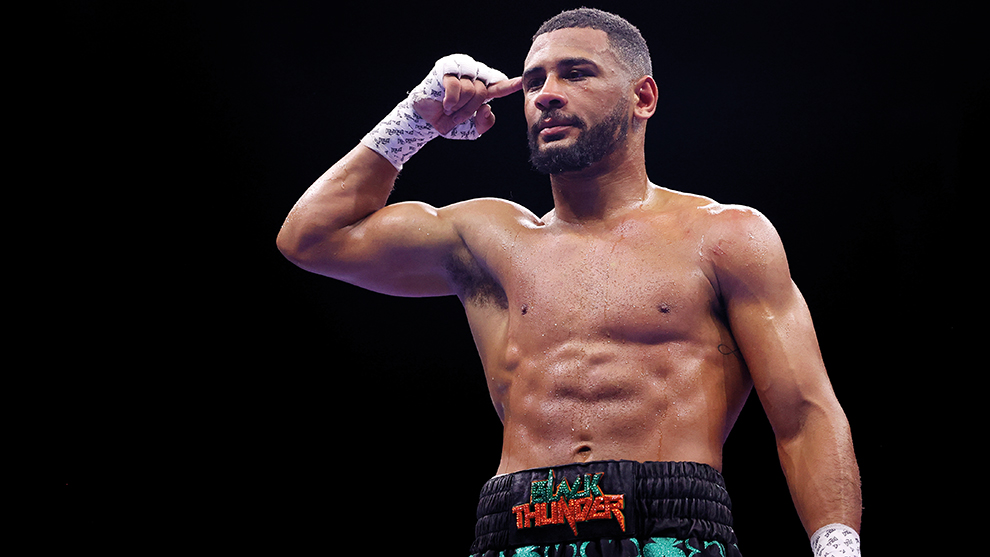BN: Belfast has a historical reputation for being a place of fighting. Tell me about your experience growing up as a person of color in Turf Lodge. Did you face a lot of racism?
CA: My family was one of the first mixed-race families in West Belfast, but we didn’t feel different. There were some instances of racism, especially at school and from certain people, but it wasn’t an everyday occurrence. Overall, we felt welcomed. My family was well-known in Turf Lodge, and my grandfather even helped build the boxing club I trained at.
BN: Were you always a feisty kid, someone who enjoyed fighting, before getting involved in boxing?
CA: I was naturally feisty and had some anger issues when I was younger. Boxing became a way for me to channel that anger and frustration. It influenced my boxing style. However, I learned to control my temper as I got older, thanks to boxing. I matured and let go of that frustration.
BN: The knife attack you experienced in 2017 gained a lot of attention. Will it always be a significant part of your story or just a minor detail as your career progresses?
CA: People still ask me about the attack, even after six years. I have a scar on my face, so it naturally draws attention. It’s a part of who I am, and I don’t mind discussing it. Going through that dark time made me a better person and athlete. I’ll carry it with me throughout my career. However, I don’t want to be remembered solely for being the boxer who got stabbed. I want to be recognized for my boxing skills and achievements. If sharing my story can help others, I’m willing to do so.
BN: Where do you think you would be if you hadn’t pursued boxing after the attack?
CA: I believe I would have ended up in jail if I hadn’t stuck with boxing. Revenge was tempting, considering my ego and the violation I felt. Boxing was my way out of dark times and prevented me from ruining my life and career.
BN: I heard you declined an offer from Love Island. How beneficial can reality TV platforms be for a boxer?
CA: In today’s age, social media and fame are crucial. However, Love Island wasn’t right for me because it’s scripted and requires being fake, which isn’t who I am. Hypothetically, if someone stole my girl on the show, I wouldn’t hesitate to confront them physically. For some fighters, reality TV can provide exposure, but I’m focused on becoming a world champion and fulfilling my dreams through boxing. My boxing style already generates the attention it deserves. I want to gain exposure by giving fans great fights.
BN: People have talked about the potential for you to become Ireland’s first world champion of color. When did that become a personal goal for you, and what would it mean?
CA: I realized before turning pro that Ireland had never had a black world champion. There have been great mixed-race or black fighters from Ireland, such as Tommy McCarthy and Darren Sutherland. Darren was someone I looked up to and admired. Unfortunately, he passed away before achieving his potential. Around 2015-2016, I decided that if I turned pro, I wanted to become Ireland’s first black world champion. It’s still a goal of mine, and it would mean a lot to me personally. I want to show that regardless of skin color, culture, or religion, anyone can achieve great things. I want to be a role model for aspiring boxers in Belfast and Ireland, inspiring them to pursue their dreams.
BN: Your fight style is known for its explosiveness. Is this something that comes naturally to you?
CA: Yes, it comes naturally to me. I’ve always had an explosive style, even in my amateur days. It’s in my genetics, and I’ve been naturally explosive in any sport I’ve participated in.
BN: How have your coaches at the Rotunda gym in Liverpool helped you develop as a fighter?
CA: Joe McNally and Declan O’Rourke have been instrumental in helping me focus on my mistakes. I know what I’m doing wrong, but having them correct those mistakes is crucial. Joe’s boxing knowledge is exceptional, and he can spot the smallest details of my errors. These small corrections have made me a better overall fighter.
BN: Liam Smith and JJ Metcalf are teammates at Rotunda. Who provides you with the most challenging sparring rounds?
CA: I haven’t sparred with Liam or JJ. We choose sparring partners based on their style and how it suits my upcoming opponent. During my time at Rotunda, Thomas Whittaker Hart and Scott Forrest provided me with the toughest sparring. They are a cruiserweight and light heavyweight, respectively. However, Liam and James have tremendous experience at a high level, and I can learn a lot from them.
BN: How has moving down to the super-welterweight division affected you physically?
CA: Moving down to super-welterweight hasn’t compromised my skills. In fact, I believe I’m more dangerous at 154 pounds. I still possess the power, speed, and explosiveness. I’ve competed as a middleweight for a long time, even as a super-middleweight in the amateurs. By moving down, I actually benefit from being stronger than my opponents in the division.
BN: You’re currently ranked 11th by the EBU. Are fights against Sam Eggington and Josh Kelly appealing to you? Does the EBU title interest you?
CA: I wasn’t aware of my ranking in the European rankings, but the EBU title is definitely a target for me. It’s the next step towards challenging for the European title, which I believe is only a couple of fights away. I’m interested in those fights, and if someone achieves the first black Irish world champion title before me, I will support them. My goal is to be a role model for all aspiring boxers, regardless of their background.
Source link
